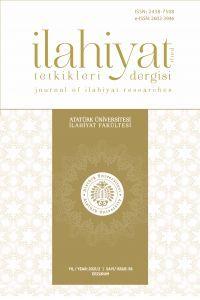Tasavvufta İhsan Teriminin Kavram Ağı Üzerine Analitik Bir Değerlendirme
An Analytical Evaluation on the Concept Network of the Term Ihsān in Sūfism
Author(s): Güldane Gündüzöz, Soner GündüzözSubject(s): Epistemology, Islam studies, Middle-East Philosophy, Ontology
Published by: Atatürk Üniversitesi İlahiyat Fakültesi
Keywords: Ṣūfism; Hierarchy of Concept; Justice; Iḥsān; Mushāhadah; Hayā; Inzi‘āc;
Summary/Abstract: Iḥsān is used in two somewhat different meanings as an act of "doing someone a favour" and "doing a good job [ıtqān]". The third meaning that the word ihsan is attributed with the signification of the hadith of D̲j̲abrāʾīl is "to worship as if seeing God". This last meaning has a moral emphasis. On the one hand, it refers to the necessity of a person to be sincere in worship, but on the other hand, it points to the ontological and epistemological depth of human existence. In this framework, iḥsān and the justice associated with it are qualities in al-Asmāʾ al-Ḥusnā of Allah. A network of semantic relations has been created in accordance with the codes of this thought in Islamic thought especially in the mystical context. In Abū al-Baqāʾ al-Kaffawī’s conceptual scheme, one of the authorities in the field of terminology, justice is superior to iḥsān. In Rāg̲h̲ib al-Iṣfahānī’s scheme, justice comes after iḥsān. However, in this last scheme, it can be seen that the concepts of justice and iḥsān are built only on the act of “obedience (giving).” It is understood that the ruʾyat Allāh and sh̲ahāda connection of the concept in question is disabled here. As for the concept scheme created by ṣūfī thought the concept of iḥsān has been placed after justice. On the other hand, the concept of mushāhadah has been evaluated in connection with concepts such as "hayā" and "inzi‘āc".
Journal: İlahiyat Tetkikleri Dergisi
- Issue Year: 2021
- Issue No: 56
- Page Range: 71-93
- Page Count: 23
- Language: Turkish

